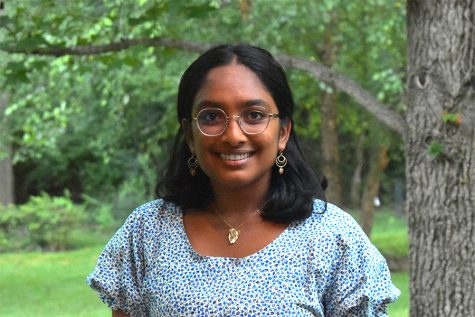Wednesday night, I happened upon social studies teacher Zaven Nalbandian’s secret surprise extra credit assignment to analyze both the State of the Union address and the Republican Party’s rebuttal. For the sake of my grade, I gave it a shot but ended up appalled at the political farce.
As President Joe Biden gave the State of the Union address and Iowa Gov. Kim Reynolds gave the Republican rebuttal, both had lofty ideals for the education system. However, neither of them addressed reforms that would strengthen the state of our schools.
Biden is a well-known moderate, and he conveniently neglected to address many issues supported by more radical members of his party, keeping with his theme of unity. But, in doing so, he failed to offer specific reflection and action that might better our schools.
Reynolds also failed at specificity; she could not offer direct responses to Biden’s propositions, relying instead on standard Republican statements as a crutch to tell her, at most, mildly relevant personal anecdotes.
In keeping with tradition, both politicians ended their statements with “The state of the union is strong.” But the state of our schools is not.
Type the terms “school” and “news” into any search engine. A Florida State Senate Committee just moved the Parental Rights in Education Bill, or the “Don’t Say Gay” Bill, to the state Senate floor for voting. A bill banning “indecent” books from Utah schools just passed committee. Bullets were found in Columbia High School’s bathroom. Fla. Gov. Ron DeSantis (R) scolded students for wearing masks. Vail School District teachers are having trouble finding somewhere to live nearby on their salaries.
These are the reforms we want:
- Unrestricted access to education (no book bans, curriculum editing, etc.)
- An environment where marginalized groups are seen, heard and comfortable (access to all-gender bathrooms, LGBTQ and comprehensive sex education, etc.)
- Reducing gun violence, particularly in schools (more significant crackdown on shadow guns, a reasonable increase in background checks, etc.)
- Access to confidential mental health services
- Increased compensation for teachers, staff and administrators
Biden did not reasonably propose any of these reforms in his address March 1.Instead, when addressing mental health, he focused on social media platforms’ “national experiment on our children.” While we should increase checks and regulations on the social media industry, we are currently in a mental health epidemic and regulating platforms will not solve the problem. In addition, Biden did not propose broadening access to therapy and other resources that help students cope with mental health issues. Independently-operated government-funded mental health resource centers are necessary for confidential care.
While schools offer mental health services, they’re either carried out by school counselors who are overworked and can’t offer regular sessions or through separate district programs that inform parents and teachers of program involvement. This worries students because mental health issues still have stigma tied to them, and they do not want to be seen differently for seeking help.
Unlike his vague and barely relevant mental health comments, Biden did propose concrete solutions to gun violence. He stated that he has urged Congress to pass bills with increased background checks and dissolution of shadow gun distributors. However, the two bills that recently passed the House of Representatives likely will not pass the Senate as they call for more restrictions than the failed bipartisan Manchin-Toomey Bill proposed after the Sandy Hook tragedy. While mentioning his support for these bills might improve his approval ratings, they will not result in concrete change and it was wrong to imply so.
Mental health and gun violence were the two issues Biden addressed; there were more he neglected to discuss altogether. He never talked about LGBTQ people and the discrimination they are facing at the hands of policymakers themselves. He didn’t tackle the book bans and the debates about parents’ involvement in the public school curriculum. He didn’t mention how teachers are underpaid and leaving the profession in greater numbers.
In her rebuttal, Reynolds did mention a portion of the issues Biden neglected, some in passing and others in detail. She strongly supported keeping schools open throughout the pandemic, championing it to solve issues such as anxiety and depression. Keeping schools open might be part of the solution, but is definitely not all of the solution to mental health and learning loss. We want schools open, but we want them open safely. This move was labeled as “the start of a pro-parent, pro-family revolution.”
Reynolds implied that schools need to stop teaching curriculum about topics like racism, that parents should not be told to “sit down, be silent, and let the government control their kids’ education and future.” She loudly asserted, “Parents matter. They have a right to know, and to have a say in, what their kids are being taught.”
According to substantive due process and case law, parents’ rights to direct their children’s education is protected by the 14th Amendment. Wisconsin v. Yoder was one case that protected parents’ right to control their children’s education. It found that states’ commitment to universal education could not infringe on families’ rights to religious practice under the First Amendment in a case between Wisconsin and an Amish family. However, if the Yoder family chose to act on this and pull their children out of school, it would not affect any children beyond their own.
Parents should not have a say in what their kids are being taught to such an extent that it affects kids beyond their own. Want to sign a waiver to pull your kid out of health class? Sure. But parents should not have the right to alter the core curriculum and the dissemination of unbiased information about the state and history of our world.
Students have a right to access information freely. Tinker v. Des Moines established that students and teachers don’t “shed their right to free speech at the schoolhouse gate.” Teachers should have the freedom to teach topics how they see fit in their own classrooms. Goss v. Lopez found that education is a right of students, protected similarly to property rights. At the high school level, we need to protect students’ rightful access to information such that they can think critically and begin to form their own opinions, whatever they may be.
Reynolds said parents are “tired of politicians who tell parents they should sit down.” But, it’s students that are tired. We’re tired of seeing the same issues in the headlines every week. We’re tired of these issues not being addressed. We’re tired of politicians deciding what we want and not being seen or understood.
Most of the reforms we call for above could pass along nonpartisan lines. Stop polarizing these issues and strengthen the state of our schools.



![Sitting courtside before a junior varsity girls’ tennis match, senior Tanisi Saha rushes to finish her homework. Saha has found herself doing academic work during her athletic activities since her freshman year. “Being in sports has taught me how to stay organized and on top of my schoolwork. [With] a busy practice and game schedule, I’ve learned to manage my homework and study time better,” Saha said.](https://pwestpathfinder.com/wp-content/uploads/2025/11/DSC_0022-1200x800.jpg)
![Sophomore Maryem Hidic signs up for an academic lab through Infinite Campus, a grading and scheduling software. Some students enjoyed selecting their responsive schedule in a method that was used school-wide last year. “I think it's more inconvenient now, because I can't change [my classes] the day of, if I have a big test coming and I forget about it, I can't change [my class],” sophomore Alisha Singh said.](https://pwestpathfinder.com/wp-content/uploads/2025/10/DSC_0012-1200x801.jpg)
![Senior Dhiya Prasanna examines a bottle of Tylenol. Prasanna has observed data in science labs and in real life. “[I] advise the public not to just look or search for information that supports your argument, but search for information that doesn't support it,” Prasanna said.](https://pwestpathfinder.com/wp-content/uploads/2025/10/DSC_0073-2-1200x800.jpg)
![Junior Fiona Dye lifts weights in Strength and Conditioning. Now that the Trump administration has instituted policies such as AI deregulation, tariffs and university funding freezes, women may have to work twice as hard to get half as far. "[Trump] wants America to be more divided; he wants to inspire hatred in people,” feminist club member and junior Clara Lazarini said.](https://pwestpathfinder.com/wp-content/uploads/2025/05/Flag.png)
![As the Trump administration cracks down on immigration, it scapegoats many immigrants for the United States’ plights, precipitating a possible genocide. Sophomore Annabella Whiteley moved from the United Kingdom when she was eight. “It’s pretty scary because I’m on a visa. When my visa expires next year, I’m not sure what’s going to happen, especially with [immigration] policies up in the air, so it is a concern for my family,” Whiteley said.](https://pwestpathfinder.com/wp-content/uploads/2025/05/DSC_0077-7copy.jpg)
![Shifting global trade, President Donald Trump’s tariffs are raising concerns about economic stability for the U.S. and other countries alike. “[The tariffs are] going to pose a distinct challenge to the U.S. economy and a challenge to the global economy on the whole because it's going to greatly upset who trades with who and where resources and products are going to come from,” social studies teacher Melvin Trotier said.](https://pwestpathfinder.com/wp-content/uploads/2025/05/MDB_3456-1200x800.jpg)



![Some of the most deadly instances of gun violence have occurred in schools, communities and other ‘safe spaces’ for students. These uncontrolled settings give way to the need for gun regulation, including background and mental health checks. “Gun control comes about with more laws, but there are a lot of guns out there that people could obtain illegally. What is a solution that would get the illegal guns off the street? We have yet to find [one],” social studies teacher Nancy Sachtlaben said.](https://pwestpathfinder.com/wp-content/uploads/2025/01/DSC_5122-1200x800.jpg)

Phillip Caldwell • Mar 11, 2022 at 9:36 am
Great piece. Well written. Well thought out. Well researched.
Serena • Mar 6, 2022 at 10:20 pm
very insightful article Brinda!